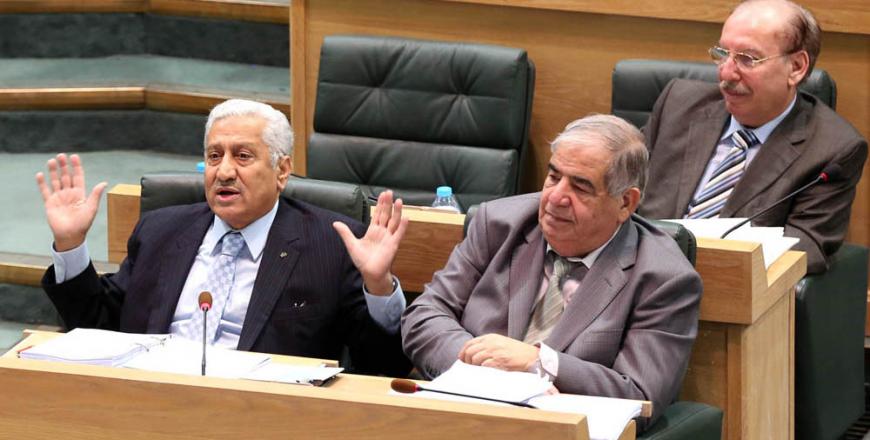You are here
Jordanians less optimistic over various challenges — survey
By Khetam Malkawi - Feb 02,2017 - Last updated at Feb 02,2017
AMMAN — Jordanians are less optimistic about the direction of the country and its economy than they were in November, while one-third believe that Jordanian-US relations will not remain the same given the new US administration, according to a recent poll.
The survey, conducted in January by the University of Jordan’s Centre for Strategic Studies (CSS) and released Wednesday, found that 45 per cent of those sampled believe that the Kingdom is going in the right direction, compared to 52 per cent in a similar poll conducted by the CSS in November.
Of this sample, 54 per cent believe that the situation is becoming worse, up from 45 per cent in November’s poll.
The survey polled 1,824 Jordanians over 18 and a smaller group of 700 “opinion leaders”, such as political figures, academics and journalists, about the government’s performance and other current issues.
Findings showed that only 37 per cent of opinion leaders are positive about the path the country is taking, down from 58 per cent in the last poll.
Poverty, unemployment, high prices and the economic situation in general were the primary concerns for those surveyed — both the national sample and opinion leaders.
Gov’t performance
Judging the government’s performance, 45 per cent of the national sample and 42 per cent of opinion leaders said they believe the government was able to shoulder its responsibilities.
Meanwhile, some 40 per cent of surveyed members of the public expressed their confidence that Prime Minister Hani Mulki is capable of shouldering his own specific responsibilities, compared with 46 per cent of opinion leaders.
Twenty-five per cent of the public surveyed, and 29 per cent of opinion leaders, believe that the government is incapable of shouldering its responsibilities due to the continuous prices hikes, which they blamed on weak planning and administration.
Meanwhile, 42 per cent of the public and 45 per cent of opinion leaders said the government will be better able to perform following the recent government reshuffle.
Economy
Of the public sample, 57 per cent believe that the economic situation in the Kingdom is worse now than it was 12 months ago, while 71 per cent of opinion leaders believe it is worse.
Jordanian-US ties
Almost 33 per cent of the national sample and 15 per cent of opinion leaders believe that Jordanian-US relations will be worse with the new US administration. However, 55 per cent of the opinion leaders said it would remain the same.
Of the national sample, 66 per cent said the US administration would favour Israel in any suggested solution to the Palestinian issue, with 81 per cent of the opinion leaders believing the same.
Syria’s crisis
Asked about their views on the Astana talks, 66 per cent of the national sample and 60 per cent of opinion leaders said they did not believe that the meeting would lead to a complete ceasefire between the opposition factions and the Syrian regime.
In addition, 68 per cent of the national sample and 57 per cent of opinion leaders did not believe that these talks will lead to a political solution to the crisis.
As for Syrian refugees in Jordan, 63 per cent of the national sample and 67 per cent of the opinion leaders believe that the Jordanian government should encourage the return of Syrian refugees when the crisis ends.
Regarding work permit exemptions for Syrian workers in the country, 83 per cent of the national sample said this decision would have a negative impact on the labour market. Of the same sample, 69 per cent said they did not believe that the new US administration would contribute to solving the Syrian crisis this year.
War on terrorism
As for the war on terrorism, 39 per cent of the national sample believed that the best way to counter terrorist groups is through undertaking special operations in their areas.
Security situation
Of those surveyed, 59 per cent said they have concerns about the possibility of terrorist attacks against Jordan, while 52 per cent said they are worried about Jordan becoming involved in a war.
Arab Summit
Half of the national sample and 49 per cent of opinion leaders believed that the Arab summit, which will take place in Amman in March, will not have any positive impact on efforts to solve the Arab world’s issues. Meanwhile 42 per cent of the national sample and 37 per cent of opinion leaders support Syria’s participation in the Arab summit.
Related Articles
AMMAN — Jordanians are less optimistic about the direction of their country than they were in September, but optimists remain a majority, ac
Jordanians’ satisfaction with the performance of the incumbent government of Abdullah Ensour witnessed an increase four months since the last comprehensive poll by the University of Jordan’s Centre for Strategic Studies (CSS).
Fifty-four per cent of Jordanians believe that the incumbent government of Prime Minister Abdullah Ensour has been able to shoulder its responsibilities, showing a rise in the Cabinet’s approval rate, according to a poll released Tuesday.

















